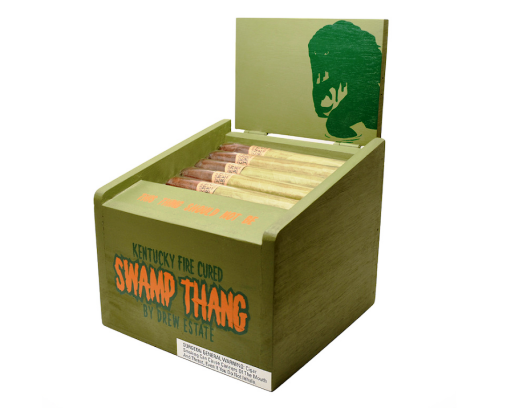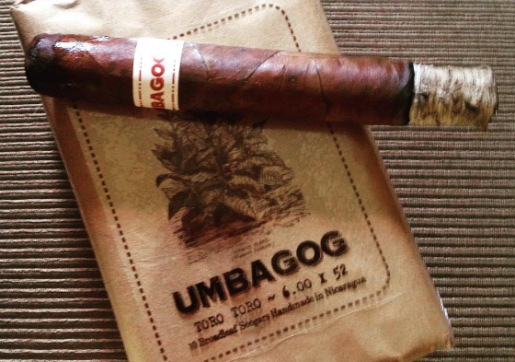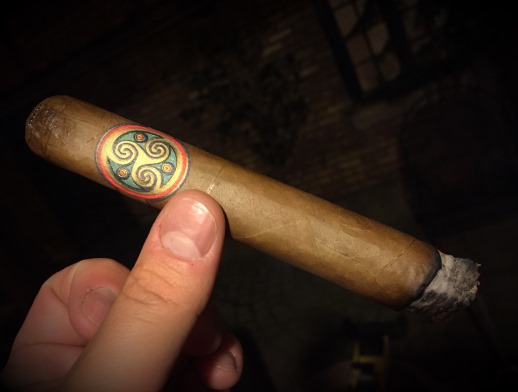Stogie Guys Friday Sampler No. 489
22 Jul 2016
As we have since July 2006, each Friday we’ll post a mixed bag of quick cigar news and other items of interest. Below is our latest Friday Sampler.

1) Announcements of new cigar releases continue to roll out at what seems like a record pace in advance of what might be the most important IPCPR Trade Show in history. On Wednesday, we learned Drew Estate is launching candela-wrapped line extensions called Kentucky Fire Cured Swamp Thang and Swamp Rat. “This thing should not be, and it’s a deeply disturbing yet pleasing smoke,†reads a press release. “Deep in the swamps it is lurking, waiting to be discovered. By pairing this deliciously sweet candela wrapper with the smoky and tasty Kentucky Fire Cured tobaccos, an eerie mystery has been revealed for a unique and powerful experience.†Three new cigars will be sold in ten-count paper bundles for $7.50 to $8.75: Kentucky Fire Cured Swamp Thang Toro (6 x 52), Kentucky Fire Cured Swamp Thang Rat (6 x 46), and Kentucky Fire Cured Swamp Thang Robusto (5 x 54). “We continue to demonstrate our leadership in the fire-cured tobacco segment, making history as the first company to blend candela and Kentucky Fire Cured tobaccos in the premium segment,†said Jonathan Drew.
2) Recluse has introduced the Amadeus Corojo Reserva, Amadeus Rosado, and OTG Connecticut. The former features a “very special Corojo wrapper that we have been holding onto for years” around Dominican, Sumatran, and Mexican filler tobaccos. The Recluse Amadeus Rosado boasts “the finest Ecuadorian Rosado wrapper available on the market” with Dominican, Pennsylvanian, and Mexican fillers. Recluse president Scott Weeks calls the blend “one of the most complex cigars we have ever made.” Finally, OTG Connecticut is an expansion of the original OTG Maduro blend, which was the very first blend Recluse offered to the U.S. market. It sports a Grade A Connecticut Shade wrapper around Dominican and Sumatran fillers. All three will be sold in 14 sizes with prices ranging from $5.95 for the Petit Corona (4 x 42) to $11.95 for the Kanu #3 (8 x 58).
3) Inside the Industry: La Flor Dominicana has announced a smaller “Petite” size of La Nox, its blend using a dark Brazilian wrapper, Mexican binder, and Nicaraguan filler. Viva Republica is adding Art of War, a new blend made at La Aurora with a stalk-cut Connecticut Broadleaf wrapper over a binder of Ecuadorian Sumatra surrounding Colombian, Dominican, and Nicaraguan filler. Sindicato is set to resurrect the Particulares brand, a Nicaraguan puro made by Casa Fernandez to be sold in five sizes with prices ranging from $7.50 to $10 per cigar.
4) From the Archives: With the next IPCPR Cigar Trade Show set to open in imminently, it is interesting to look back at last year’s show to see how much has changed, or hasn’t. In a wrap-up from last year’s show, we noted a few key observations, including decreased attendance, numerous exhibitors, cautious optimism (now seemingly somewhat myopic) about the FDA, and increased discussion about evolving Cuban-U.S. relations.
5) Deal of the Week: StogieGuys.com recommends Bespoke Post, a monthly collection of awesome items delivered to your door for just $55. Past boxes include barbecue accessories, shaving kits, everything you need to make great coffee, and exclusive cigars from E.P. Carrillo paired with custom accessories. You can select a box each month or skip the month entirely. Click here to sign up today.
photo credit:Â Drew Estate


 For its latest release, Cornelius & Anthony has turned up the heat.
For its latest release, Cornelius & Anthony has turned up the heat.




 Shah’s newest creation is called Gaaja (pronounced Gaa-ya), which is Sanskrit for elephant. “We had been working on the blend of Gaaja for more than four years,†reads a press release dated June 20. “The process involved in logistics and long fermentation of tobacco from countries like Peru and Paraguay really tested our patience. We had to wait for three vintages of the hybrid Connecticut wrapper leaf for the perfection we wanted.â€
Shah’s newest creation is called Gaaja (pronounced Gaa-ya), which is Sanskrit for elephant. “We had been working on the blend of Gaaja for more than four years,†reads a press release dated June 20. “The process involved in logistics and long fermentation of tobacco from countries like Peru and Paraguay really tested our patience. We had to wait for three vintages of the hybrid Connecticut wrapper leaf for the perfection we wanted.â€
 Patrick Ashby
Co-Founder & Editor in Chief
Patrick Ashby
Co-Founder & Editor in Chief Patrick Semmens
Co-Founder & Publisher
Patrick Semmens
Co-Founder & Publisher George Edmonson
Tampa Bureau Chief
George Edmonson
Tampa Bureau Chief